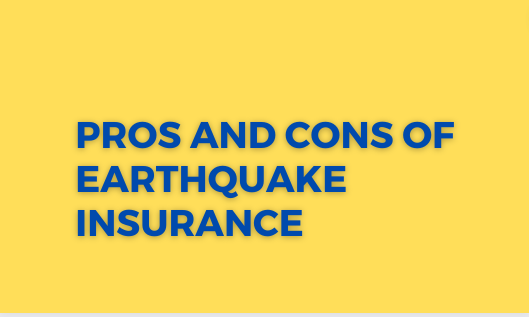Earthquake insurance is a specialized form of insurance that provides coverage for damages and losses caused by earthquakes. Below are pros and cons of earthquake insurance. Understanding these pros and cons can help individuals assess their unique circumstances and make informed decisions regarding earthquake insurance.
Pros:
- Financial Protection: Earthquake insurance provides financial protection against the substantial costs of repairing or rebuilding property damaged by earthquakes.
- Peace of Mind: Having earthquake insurance can provide peace of mind, knowing that you are financially prepared for the potential devastation caused by earthquakes.
- Property Coverage: Earthquake insurance typically covers both structural damage to buildings and personal property within them.
- Loss Recovery: With earthquake insurance, policyholders can recover their losses and mitigate the financial burden of rebuilding after an earthquake.
- Replacement Cost Coverage: Earthquake insurance often provides coverage for the full replacement cost of damaged or destroyed property, rather than just the actual cash value.
- Government Assistance Supplement: Earthquake insurance can supplement government assistance programs, providing additional financial support after an earthquake.
- Risk Mitigation: Having earthquake insurance incentivizes property owners to implement risk mitigation measures, such as strengthening structures, to reduce damage potential.
- Business Continuity: Earthquake insurance can help businesses recover and resume operations after an earthquake, minimizing financial losses due to business interruption.
- Coverage for Additional Expenses: Earthquake insurance may cover additional expenses, such as temporary housing, while repairs or rebuilding take place.
- Lender Requirements: In earthquake-prone areas, some lenders may require earthquake insurance as a condition for obtaining a mortgage.
- Customizable Coverage: Earthquake insurance policies often offer options to customize coverage based on individual needs and preferences.
- Regional Suitability: Earthquake insurance is particularly suitable for individuals residing in areas prone to earthquakes, providing tailored coverage for their specific risks.
- Loss Assessment Coverage: Some earthquake insurance policies include coverage for loss assessments charged by homeowner associations for shared property repairs.
- Protection for Rental Properties: Earthquake insurance can protect landlords from significant financial losses caused by earthquake-related damages to rental properties.
- Availability of Deductible Options: Earthquake insurance policies offer deductible options, allowing policyholders to choose a deductible amount that fits their budget.
- Legal Coverage: Earthquake insurance may cover legal expenses if disputes arise regarding coverage or claim settlements.
- Enhanced Financial Resilience: Earthquake insurance contributes to overall financial resilience by reducing the impact of unexpected earthquake-related costs.
- Mitigating Personal Financial Risk: Earthquake insurance protects individuals from significant personal financial losses that could take years to recover from.
- Strengthening Community Recovery: Widespread adoption of earthquake insurance strengthens community recovery efforts after earthquakes by ensuring resources are available for rebuilding.
- Supporting Local Economies: Earthquake insurance helps support local economies by facilitating post-earthquake recovery and minimizing economic disruptions.
Cons:
- Cost of Premiums: Earthquake insurance premiums can be costly, especially in high-risk areas, and may be a significant ongoing expense.
- High Deductibles: Earthquake insurance often comes with high deductibles, meaning policyholders must pay a substantial amount out of pocket before coverage kicks in.
- Coverage Limitations: Some earthquake insurance policies have coverage limits, which may not fully cover the total cost of damages or losses.
- Complexity of Policies: Understanding the terms, conditions, and exclusions of earthquake insurance policies can be complex and may require careful review.
- Exclusion of Certain Damage Types: Earthquake insurance may exclude coverage for specific types of damage, such as landslides or liquefaction, requiring additional coverage.
- Geographical Limitations: Earthquake insurance is typically limited to specific geographical areas with a higher risk of earthquakes, leaving other regions without coverage options.
- Limited Availability: Earthquake insurance may not be widely available in all areas, making it challenging for some property owners to obtain coverage.
- Pre-existing Damage Exclusions: Earthquake insurance policies may exclude coverage for pre-existing damage or maintenance-related issues.
- Claim Settlement Challenges: The claims process for earthquake insurance can be lengthy and complex, resulting in potential delays and disputes.
- Mandatory Waiting Periods: Some earthquake insurance policies have mandatory waiting periods before coverage becomes effective, leaving a gap in protection.
- Lack of Retroactive Coverage: Earthquake insurance policies generally do not cover damages resulting from earthquakes that occurred before the policy was purchased.
- Affordability Concerns: The cost of earthquake insurance may be prohibitively expensive for some property owners, making it difficult to obtain coverage.
- Market Volatility: The earthquake insurance market can be volatile, with premiums fluctuating based on changes in risk assessment and market conditions.
- Limited Coverage for Older Buildings: Some earthquake insurance policies may have limited coverage options or higher premiums for older buildings due to increased vulnerability.
- Rebuilding Challenges: While earthquake insurance provides financial support, the process of rebuilding damaged property can still be time-consuming and disruptive.
- Overlapping Coverage: Homeowners may already have some coverage for earthquake damage through their homeowners’ insurance policy, making additional earthquake insurance redundant.
- Limited Coverage for Personal Belongings: Earthquake insurance may have limitations on coverage for personal belongings, requiring separate policies for valuable items.
- Negative Equity Concerns: In cases where the cost of rebuilding exceeds the property’s market value, earthquake insurance may not fully cover the difference.
- Limited Public Assistance: Reliance solely on earthquake insurance may limit access to public assistance programs that provide additional support after a major earthquake.
- Changing Risk Assessment: Earthquake risk assessment is subject to change over time, which may impact coverage availability and affordability in certain areas.
Pros
- Financial Protection
- Peace of Mind
- Property Coverage
- Loss Recovery
- Replacement Cost Coverage
- Government Assistance Supplement
- Risk Mitigation
- Business Continuity
- Coverage for Additional Expenses
- Lender Requirements
- Customizable Coverage
- Regional Suitability
- Loss Assessment Coverage
- Protection for Rental Properties
- Availability of Deductible Options
- Legal Coverage
- Enhanced Financial Resilience
- Mitigating Personal Financial Risk
- Strengthening Community Recovery
- Supporting Local Economies
Cons
- Cost of Premiums
- High Deductibles
- Coverage Limitations
- Complexity of Policies
- Exclusion of Certain Damage Types
- Geographical Limitations
- Limited Availability
- Pre-existing Damage Exclusions
- Claim Settlement Challenges
- Mandatory Waiting Periods
- Lack of Retroactive Coverage
- Affordability Concerns
- Market Volatility
- Limited Coverage for Older Buildings
- Rebuilding Challenges
- Overlapping Coverage
- Limited Coverage for Personal Belongings
- Negative Equity Concerns
- Limited Public Assistance
- Changing Risk Assessment



